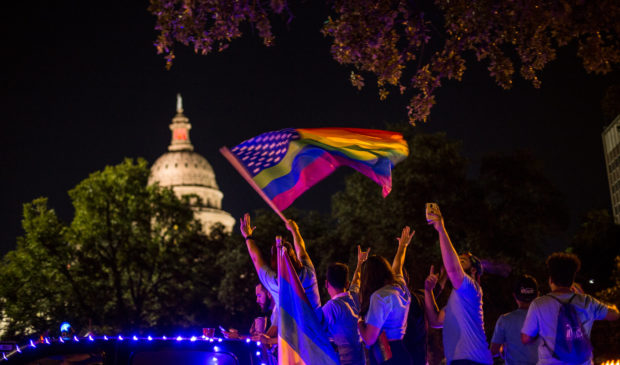Study reveals positive developments for LGBT Austinites
Thursday, October 14, 2021 by
Sean Saldaña On Tuesday, Austin’s LGBTQ+ Quality of Life Commission presented its first ever LGBTQIA+ quality of life study to City Council. Overall, the report paints a nuanced but optimistic picture for LGBT Austinites.
The report, which has been in the works since 2017 when the commission was founded, includes interview excerpts, demographic data, survey responses, and accounts from members of Austin’s LGBT community with the goal of giving policymakers “information that can be used to form the city’s budgeting decisions and policies that drive outcomes” for LGBT community members.
Currently, 5.9 percent of the city’s population identifies as LGBT, making it third in terms of large metropolitan areas in the United States, behind Portland and San Francisco. In real terms, this means that there are somewhere between 100,000 and 118,000 LGBT people in Austin and the surrounding areas.
The findings were reported to Council by Charles Robbins, a principal with HMA Community Strategies. He said this report was the first time he’s seen “a city municipality put out a (request for proposal) to study a marginalized community with centering equity,” and went as far as to describe it as “groundbreaking.”
In 1,792 survey responses, 97 percent of respondents reported feeling accepted by friends and chosen family members. Acceptance from biological families came at 64 percent and acceptance at work at 58 percent. That said, there were areas where acceptance was not nearly as strong, like places of worship at 18 percent and schools at 10 percent.
A series of interviews with 30 community members back up the survey results. Participants reported “being happy living in Austin and felt supported, welcome and accepted as an LGBTQIA+ person,” though “many interviewees identified safety as a challenge and concern, specifically transgender individuals and people of color.”
The report also provides important data on other long-standing challenges for LGBT people, including sometimes fraught relationships with law enforcement.
Out of 1,968 respondents, 41 percent felt either somewhat or very comfortable seeking help from police. Nearly an identical portion felt the opposite, with 42 percent of respondents feeling either somewhat or very uncomfortable seeking help from police.
More than half of respondents felt that they were treated with respect while interacting with police, though 18 percent reported being treated with disrespect.
Another positive development is that, over the past year, a majority of the community members haven’t reported experiencing any anti-LGBT behaviors.

LGBT Austinites also report enjoying relatively stable employment and job opportunities, as surveys revealed that only 3 percent were unable to work and only 4 percent were unemployed.
Perhaps most importantly, two-thirds of respondents indicated that they were satisfied or very satisfied with their quality of life.
The report did have some areas of concern for policymakers. Robbins told Council, “You would’ve thought that with marriage equality, things would change, but there’s still work to be done.”
Out of 1,855 responses, 47 percent acknowledged contemplating suicide and 18 percent had actually made an attempt. Additionally, more than half of respondents said they’d been pressured or forced to engage in unwanted sexual activities from someone in their lifetime.
The quality of life study reveals a number of important things about being LGBT in Austin; on the whole, people expressed that they generally feel safe, accepted and comfortable with their lives. However, many long-standing issues, from lack of acceptance in religious communities to being disproportionately affected by abuse, still linger.
The report goes on to highlight a number of recommendations like improving data collection for sexual orientation and gender identity, a focus on affordable housing policy, addressing health disparities, and prioritizing the needs of trans people.
One policy recommendation in particular that caught the attention of Council was the suggestion of a community center as a way of creating greater cohesion among LGBT people, as well as addressing mental and physical health needs. In his presentation, Robbins cited examples of centers in Phoenix and Houston as starting places. Many of these centers are started as 501(c)(3) and receive funding for specific programs and services by cities and private donors.
In terms of first steps, Robbins told Council, “If there were city property that could be repurposed, that would be an excellent start.”
Photo made available through a Creative Commons license.
The Austin Monitor’s work is made possible by donations from the community. Though our reporting covers donors from time to time, we are careful to keep business and editorial efforts separate while maintaining transparency. A complete list of donors is available here, and our code of ethics is explained here.
You're a community leader
And we’re honored you look to us for serious, in-depth news. You know a strong community needs local and dedicated watchdog reporting. We’re here for you and that won’t change. Now will you take the powerful next step and support our nonprofit news organization?







